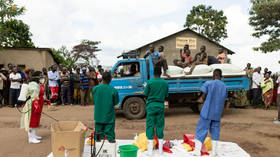Scientists suggest when cancer jab may be available

Cancer vaccines could be available to patients by 2030, the German couple behind the Pfizer-BioNTech vaccine, one of the most effective jabs against Covid-19, have claimed.
Professors Ugur Sahin and Ozlem Tureci told BBC’s ‘Sunday with Laura Kuenssberg’ that they “feel that a cure for cancer or to changing cancer patients’ lives is in our grasp.” The couple co-founded the biotech company BioNTech in Mainz in 2008.
Commenting on the possible timeline, Sahin said that cancer vaccines could become globally available “before 2030.”
However, they also attempted to strike a more cautious tone. “As scientists we are always hesitant to say we will have a cure for cancer,” Tureci said, although she hinted that their company has had “a number of breakthroughs.”
According to the scientists, one of the possible consequences of the pandemic was that it could have hastened the invention of a cancer vaccine. Tureci noted that while BioNTech’s achievements in the sphere of cancer vaccine development have been “the tailwind for developing the Covid-19 vaccine,” now it works the other way around.
“And now the Covid-19 vaccine and our experience in developing it gives back to our cancer work,” she added.
The doctor went on to say that scientists have “learned how to better, faster manufacture vaccines” and have gained a deeper understanding of how the immune system reacts to mRNA.
Unlike conventional vaccines, which are produced with the help of weaker forms of a virus, mRNA technology uses only a virus’s genetic code. When mRNA enters the body, it also enters its cells and orders them to create the relevant antigens.
Basically, “mRNA is the blueprint for the ‘Wanted’ poster of the enemy,” Tureci explained, adding that such tactics help to train the body to find cancer cells and attack them.
The Pfizer-BioNTech jab was the first Covid-19 vaccine approved by the US Food and Drug Administration. At the time, it showed a 91% efficacy and has since been proven capable of reducing the number of hospitalizations and deaths due to the virus.













